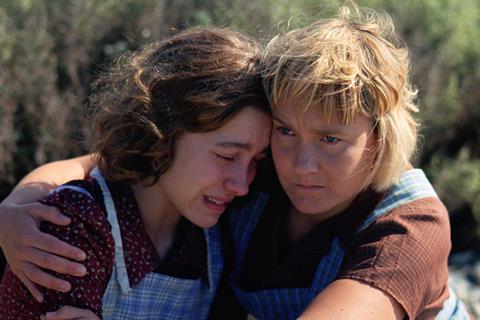Danish writer/director Malou Reymann tells Screen about combining historical truth with contemporary emotional resonance in Discovery title Unruly.

Malou Reymann’s feature Unruly is a study of how women’s rights were abused in 1930s Denmark. When the film was still in post, the news arrived from the US that Roe v Wade was being overturned. “There is this theme about how society has been so interested in controlling women’s bodies and it’s scary how relevant it is. It shows how female reproduction still touches a deep fear in some people.”
Unruly is set at the Sprogo women’s institution in 1930s Denmark, when “morally feeble” girls and women were banished to an island to become more compliant (and sometimes forced to be sterilised). The story focuses on Maren, an unruly 17-year-old who refuses to conform, and the spark she ignites in the more dutiful resident Sorine.
Reymann first heard about the institution — and the practice of forced sterilisation — on a podcast several years ago. “This story stayed with me. I was surprised it hadn’t been made into a film yet,” she says.
“When I was making [feature debut] A Perfectly Normal Family, I told the story to [producer] Matilda Appelin, who was also surprised it hadn’t been made into a film. We said, ‘We need to make it. It was a feeling like this story was waiting for us. We ran with it.”
Deep dive
Reymann co-wrote the script with Sara Isabella Jonsson Vedde and the pair did a lot of research about the institution’s staff and residents, researching journals and medical records in Denmark’s National Archives. “At its core, the film had to be the women’s emotional experience,” Reymann says. “But it was important to base it all on what happened or what could have happened. I wanted it to be authentic.”
The script structure highlights the journeys of both girls. “Even when we were working on the synopsis, we had this concept that one girl starts downward, and the other girl is rising upwards, so they kind of cross in the middle and teach [each] other through this close friendship. We wanted to find some hope.”
Emilie Kroyer Koppel and Jessica Dinnage play the leads, with the latter reuniting with the director after A Perfectly Normal Family. In pre-production, Reymann was careful to foster an intimacy between the two actresses and herself. Also, she adds, “I’ve been a young actress, so I worked with directors who take responsibility and ones who don’t. Especially for young actors, it just makes a difference to know who you can trust.”
Unruly marks Reymann’s second feature, after A Perfectly Normal Family won the Big Screen award at International Film Festival Rotterdam in 2020. Appelin produces for Nordisk (which plans the Danish release in March 2023). TrustNordisk handles international sales and the film premieres in TIFF’s Discovery on September 10.
The team shot for about 30 days near Copenhagen. “Shooting on film was a big creative decision,” explains the director. “It felt like we couldn’t get the same authenticity digitally.” The whole production felt like it had “bigger ambition” than her debut feature.
Reymann and DoP Sverre Sordal visited the locations in advance, and Reymann would act out the scene loosely while Sordal would take photos to discuss later “so we were really prepared”. They used a lot of static camera, a style the pair had employed on A Perfectly Normal Family. The rest of the Unruly crew were thankful there was little improvisation in terms of set-ups: “They said it was a gift to be able to actually prepare and not have a handheld camera that can just point in all directions all the time.”
Reymann wanted the girls’ lives in Copenhagen to look “lively and messy” but for the island home in Denmark to look beautiful and well-kept, almost like a holiday destination, “so you have an ambivalence about the place, it’s not a grey prison”. She also learned what a challenge it is to shoot on a boat: “Everything just moves,” she says with a laugh.
Reymann is working next on another feminist period story, going back further, about the persecution of witches in 1600s Denmark. As with Unruly, she will find a way to bring the characters out of dusty history. “I didn’t want to make Unruly as a period film of us today looking at them then. I wanted it to feel contemporary, and I was surprised how much I could emotionally relate to them.”

























No comments yet